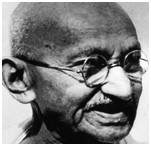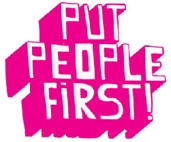|
 |
|
 |
|
|
||
Ernst Friedrich (Fritz) Schumacher, Small is Beautiful
(1973)
German-born British economist (pictured right) who worked for the National Coal Board before this world famous book It is based upon Buddhist economics that put people and the environment first in organizations. Schumacher died in 1977.
See also... Ernst Friedrich (Fritz) Schumacher in the Management Gurus section.
Book summary
People at work People’s potential, creativity and spiritual growth must be maximized at work and leisure through: a) education (the “greatest resource”).
b) fulfilling and enjoyable work (the “humanization of work”). c) small, self-managing groups and communities (pursuing common aims)
d) technology suited to people’s needs (“technology with a human face”)
e) freedom Autonomy and control over decision making at work.
Ethics and the environment People must:
a) consume less This is vital to:
Greed and excessive materialism must be avoided without stagnating the economy.
b) find wisdom (through spiritual and moral development).
c) seek the “purification of character” This is achieved through virtues like:
d) make sure science is ethical (so that it can be applied in the right way).
Intermediate technology The best way to help the world’s poor is “intermediate technology” where technology and production methods are: a) cheap and simple (so virtually everyone can use it and expensive imported machinery is unnecessary).
b) suitable for small-scale application So people can use it where they live, so:
This small-scale production:
c) people centred Intermediate technology develops people’s:
d) locally sourced (mainly using local materials).
Organization structure Organizations must balance:
The best way to do this is to “achieve smallness within large organization” through five principles:
1. The Principle of Subsidiarity If smaller units lower down the organizational hierarchy can do something, they should do it. 2. The Principle of Vindication Every organizational activity must justify itself through results like profitability.
3. The Principle of Identification Each business unit should have its own accounting systems, so that its profitability and success can be identified. 4. The Principle of Motivation Employees must be motivated through:
5. The Principle of the Middle Axiom Senior managers should give business units:
Economics Economics is destructive because it:
So we need Buddhist economics that seeks:
a) spiritual health (as well as material wealth).
b) the right balance (between enjoyable work and leisure).
c) non-violence and simple living (without greed).
Key quotes on organization structure Man is small, and, therefore, small is beautiful. The fundamental task is to achieve smallness within large organization.
Key quote on work Next to the family, it is work and the relationships established by work that are the true foundations of society.
Key quote on stress and pain It [materialism] speaks to us in the language of terrorism, genocide, breakdown, pollution, exhaustion.
Key quotes on technology The primary task of technology...is to lighten the burden of work man has to carry in order to stay alive and develop his potential. It is the sin of greed that has delivered us over into the power of the machine.
Key quote on learning and wisdom Man is far too clever to be able to survive without wisdom.
Key quote on nature and climate change If we squander the capital represented by living nature around us, we threaten life itself.
|
|
|
||
|
|
||
| Copyright © wisdomtowin.com 2025 All Rights Reserved | ||
|















